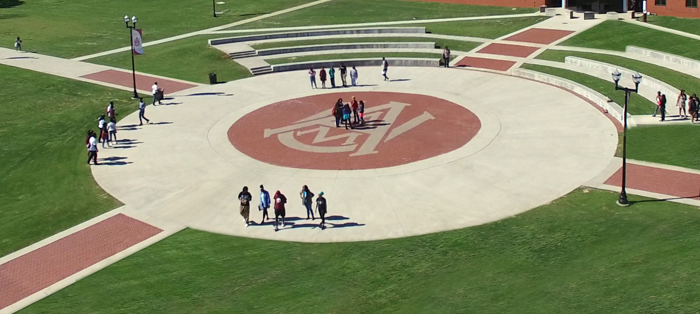Graduate Mathematics Courses
The Program of Mathematics at Alabama A&M University does not offer a graduate degree at this time; however, several graduate courses are offered each semester to serve students in other AAMU graduate programs. For the most accurate and up-to-date list of graduate math courses, please refer to the most recent graduate catalog.
From Graduate Catalog 2023-24
MTH 500 Quantitative Review for Graduate Students – 3 credit hours. This course is designed to develop basic understanding of college algebra, usage of concepts of quantification: arithmetic computation, linear and quadratic equations, inequalities, the geometry of elementary figures and similarity, measurement, set operations, coordinate systems, probability, and data analysis, including frequency distributions and descriptive statistics. Credit for this course may not be counted toward any degree requirement. Placement in this course is determined by performance on a standardized test instrument.
MTH 501 Mathematics Seminar I – 1 credit hour. Investigation and discussion of problems related to mathematics instruction and/or special topics in mathematics.
MTH 504 A Survey of Higher Mathematics – 3 credit hours. Concepts of sets, logic, probability, abstract algebra, and elementary function theory.
MTH 505 Selected Topics in Calculus and Analytic Geometry – 3 credit hours. Principal ideas and techniques of calculus and analytic geometry from a contemporary point of view.
MTH 506 Computers and the Teaching of Mathematics – 3 credit hours. A brief overview of basic concepts in computer science; mathematics materials for computers and computing; laboratory practice in programming mathematical curriculum materials.
MTH 507 Abstract Algebra – 3 credit hours. Elementary theory of groups, rings, fields, vector spaces, and linear transformations. Prerequisite: MTH 504 or instructor consent.
MTH 508 Linear Algebra – 3 credit hours. Systems of linear equations, vector spaces, matrices, linear transformations, change of basis, determinants, characteristic roots and vectors. Prerequisite: (MTH 504, MTH 507) or instructor consent.
MTH 525 Computer Theory and Programming – 3 credit hours. Advanced concepts in computer science; mathematics materials for computers and computing; and laboratory practice in programming mathematical curriculum materials.
MTH 533 Foundations of Geometry – 3 credit hours. Euclidean geometry, non-Euclidean geometry, analytic geometry, finite geometry, and similarity in Euclidean space.
MTH 552 Analysis I – 3 credit hours. Functions, sequences, limits, continuity, uniform continuity, derivatives, intermediate value theorem. Prerequisite: MTH 505 or instructor consent.
MTH 553 Analysis II – 3 credit hours. Integration, bounded variation, series, convergences, elementary functions, and sequences and series of functions. Prerequisite: MTH 552
MTH 620 Topology – 3 credit hours. The topology of the real line; Euclidean, metric, and topological spaces; connectedness; compactness, and continuity. Prerequisite: MTH 552 or instructor consent.
MTH 651 Mathematical Logic – 3 credit hours. Principles of logic and the elementary structure of mathematics; connectives and quantifiers, sets and relations; negation; inductive and deductive reasoning. Prerequisite: MTH 504 or instructor consent.
MTH 665 Theory of Numbers – 3 credit hours. Divisibility, congruencies, residues, Diophantine analysis, sieve methods, and geometry of numbers. Prerequisite: MTH 507 or instructor consent.
MTH 673 Probability and Statistical Analysis – 3 credit hours. Algebra of sets; emperical frequency distributions; combinatorics; mathematical expectation; discrete and continuous probability distributions; probability densities; hypothesis testing; and estimation. Prerequisite: MTH 504 or instructor consent.
MTH 681 Mathematics Seminar II – 1 credit hour. A study, by seminar method, of additional topics in mathematics from the history of mathematics, algebra, linear algebra, geometry, or analysis.
MTH 682 Mathematics Seminar III– 1 credit hour. A study, using research methods, of current topics in mathematics and/or mathematics education.
